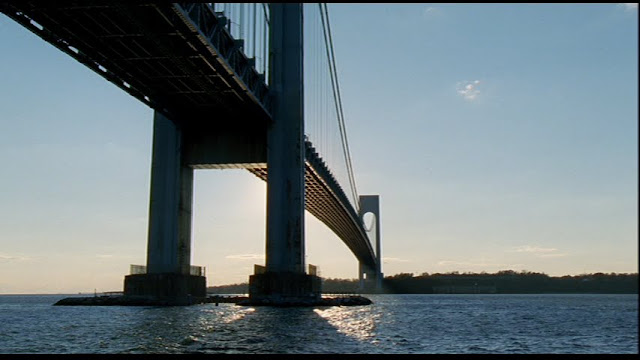I was not in a mood for this type of film when I sat down to watch it. And mood certainly matters. I can imagine that by watching the trailer, many people would guess they'll never be in the mood. You might also suppose that it would be the type of film to put you to sleep, and to be totally honest, it did that to me. Even still, after I went back to watch the piece I'd slept through, I have come away feeling like this is one of the most profound pieces of art I've experienced in ages, and I am going to try to convince you here to get in the mood and give it a shot, in case all the awards and acclaim it has received haven't already done that for you.
I was nervous even from the outset that I would drift off. It begins with lots of quiet imagery, not much action or dialogue. Manny made reference to its similarity to 2001: A Space Odyssey (as did Roger Ebert apparently, so good call, Manny!). I slept through all but about 90 seconds of that one, so I had no idea what he was talking about. But I did not drift off right away, because the images were so striking. Instead, I was reminded of Koyaanisqatsi, which is a film (trilogy) that uses nothing but imagery and sound to explore questions about the meaning of life.
I felt like you could take a still capture of every single image being shown and fill an entire art museum and have a phenomenal photographic exhibit. The light, the composition, the color, the content. It was actually overwhelming to behold so much beauty in so many forms in such a short period of time. There's a somewhat similar sequence at the end, and that's where the three weeks on 4-6 hours of sleep per night did me in. But I went back after a good night's rest and caught up on that portion and just cried through the whole twelve minutes over how excruciatingly beautiful and emotional it was, so I blame the sleep deprivation, not the film.

Not only was the visual artistry stunning, but somehow, the film managed to capture air. There is something singular about how the air feels on a sunny day in Texas (most of it is set in Waco), and through this two dimensional art form, I felt it. Perhaps that is something to be said for the excellence of the sound? However they did it, they managed to engage more senses, and therefore more attention and engagement from me than a film should be able to.
The film opens with a verse from Job:
"Where were you when I laid the earth's foundation? Tell me, if you understand."
-Job 38:4
And after a sequence of images of the formations of the earth, and the formations of the life of a boy, a voice over goes on to talk about "the way of nature" vs. "the way of grace." The effect was to convince me afresh and anew of my own smallness in the grand enormity of the universe. But even though you begin with a sense of inconsequence in your self and your own sufferings, the personal engagement you form with the characters helps you understand that even though we are relatively small, we are still imbued with great significance. Hopefully the end result is grateful humility.
Apparently Malik is a very private person, so I have no idea what his personal creed of belief might be (though there are some hints he may be Episcopalian?). Many seem to claim that the film is crafted the way it is so that whoever I am and whatever I believe, I can project my own meaning into it. Perhaps. Or perhaps he has crafted his art in such a way that he has successfully tapped into a truth that we can not actually grasp in our limited minds and therefore limited human language. So it is a limitation of our own minds rather than a wideness in possible truths that he is battling with through his artistic choices. The answer to that may be a philosophical one, independent of how Malik himself feels about the answer. But aside from his intention one way or another, I have been studying some questions around the meaning of life, resurrection, and the book of Revelation (the last chapter of which speaks multiple times of the "Tree of Life"), and I found this film to express some of the lessons I've been learning (especially from N.T. Wright's book, Surprised by Hope). I do not want to say too much about what I think the film is communicating through each detail, except to say that the film certainly seems to wrestle humbly with themes of grief, identity, sin, grace, reconciliation, and redemption. I'll leave it to you to watch it for yourself to see how all of that plays out. Of course, that is speaking to those who have not seen it. If you have seen it, I would be ever so interested to hear your thoughts!





Beautifully articulated. I believe creativity is a gift from God and that He uses all kinds of people to express His message of love--whether or not they understand it.
ReplyDelete